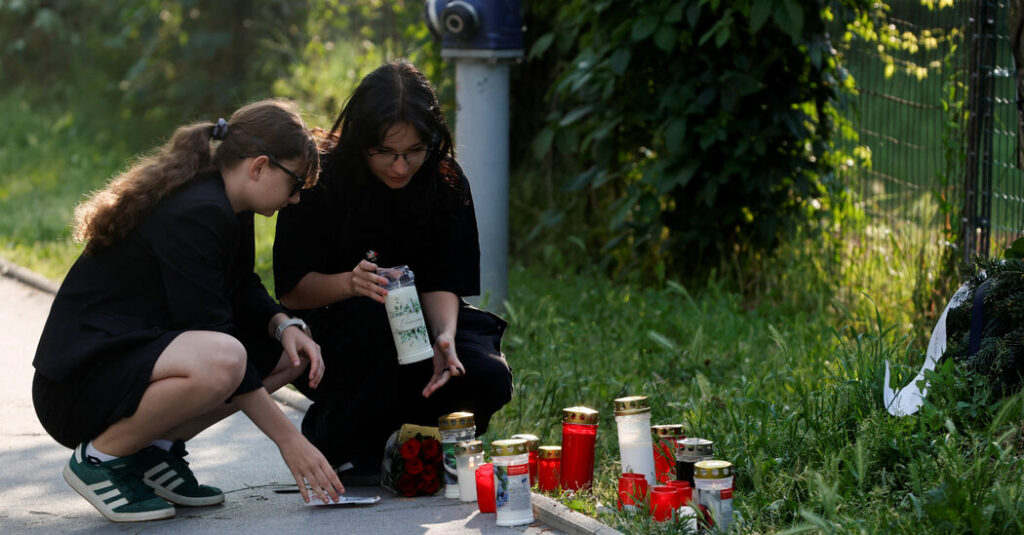Classes are canceled for at least a week, but students kept coming to their school on Wednesday morning, the day after a deadly shooting there stunned Austria.
They gathered across the street from the high school, in Graz, where a former student killed at least 10 people on Tuesday, in a spot cordoned off from other mourners, well-wishers and reporters.
They were struggling, like so many of their compatriots, to make sense of the sort of violence they see on television from America but never expected to see in their own quiet Alpine city.
“We’re just speechless — this seems to have come from nowhere,” said Simone Saccon, 20, a university student who has spent his life in Graz. He lives near the school, the BORG Dreierschützengasse, and was among those gathered outside on Wednesday.
“It’s something you imagine happens in major cities or in the U.S., but that it would happen here?” he added.
Austria was a nation in mourning on Wednesday. Black flags flapped atop the public trams in Graz, a well-to-do city that is the nation’s second-largest, after Vienna.
At 10 a.m., the trains stopped running briefly as all of Austria observed a minute of silence to honor the victims.
There was no further danger to the public, the police had said, even though the authorities confirmed they had found an unexploded pipe bomb at the assailant’s home. The 21-year-old shooter had left what officials called a “farewell letter” and a video message to his parents, then returned to the school where he never graduated.
He opened fire with a handgun and a shotgun before killing himself in a school bathroom, according to the police.
Officials said that the note had done little to demystify why the young man, who legally obtained his weapons, had embarked on the deadly school shooting — one of Europe’s worst in the past decade. Franz Ruf, public security director at the Austrian Interior Ministry, told the television channel ORF that the letter did not seem to include a motive for the attack.
And so the nation, like so many communities across the United States and around the world that have endured similar tragedy, was left to wonder what had gone wrong.
“What’s really important now is to talk, to be silent together, to listen,” said Paul Nitsche, 51, an evangelical pastor who teaches religion at the school and who was standing on the street in front of the mourning area for the students.
The Austrian chancellor, Christian Stocker, canceled appointments on Tuesday to travel to Graz and declared three days of national mourning, including Wednesday’s period of silence. Residents and political leaders were struggling to process the shock.
On Wednesday morning, a headline at the online site of Kronen Zeitung, the nation’s largest newspaper, declared: “The day after the rampage: Austria cries with Graz.”
Most of the victims were schoolchildren — six girls and three boys, all aged 14 to 17, according to the police. Another victim, a teacher, died later at a hospital.
Pastor Nitsche was alone in a classroom between lessons when he heard the shots. His first instinct was to hide and wait. “It was as silent as if it was the middle of the night,” he said. “Everyone was playing dead — smart.”
After it seemed safe, he said, he ran out into a hallway where he saw the gunman trying to get into a locked door by shooting at it. As he raced away, he saw the body of one of the victims, a girl, and kept on running until he saw the police storming in. “So many uniforms can be really comforting,” he said.
Outside the school, makeshift shrines of candles, flowers and stuffed animals lined the perimeter of the school. Investigators and firefighters were still entering and exiting the premises, but otherwise the school buildings were dark and quiet.
Officials canceled school for the remainder of the week as they decide how to proceed. The summer break starts in early July, and many graduating students have yet to take their final exams before potentially going on to university.
Belkez Halici, 39, who lives across from the school, was preparing for work on Wednesday, tears streaming down her face. She had tried to keep the news from her three children, but they had heard about it on social media, she said, and they were upset and scared.
“I’ve always said, schools here are not safe,” Ms. Halici said. “With people coming and going, it’s like a shopping center.”


